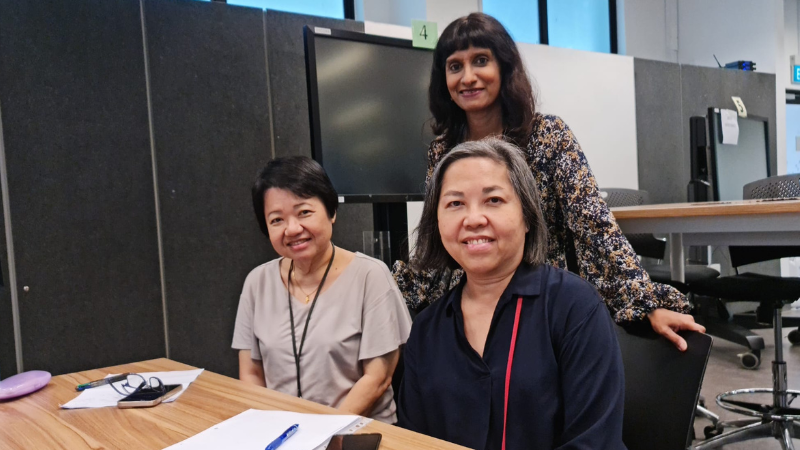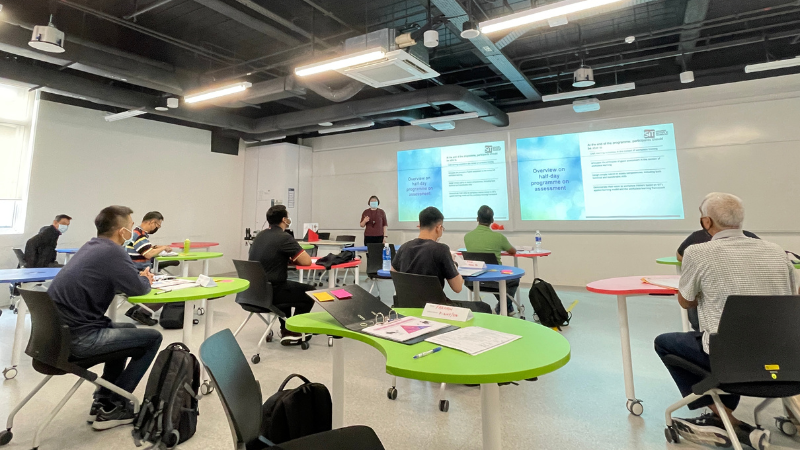Applied Research and Industry Collaborations
CPC faculty actively collaborates with industry partners and professionals from partnering universities to conduct research studies that contribute to the community and co-create solutions that improve businesses and industrial processes.
Research Projects
ALIGN Grant: Developing Critical Reflection Skills via Social Innovation
Project Duration: 1 September 2024 to December 2025
PI: A/Prof Lee Chien Ching
Co-PIs: : Intan Azura binte Mokhtar and Dan Chia Wei Ming
Key Focus: This study aims to analyze students’ reflections in five design thinking phases for their social innovation project. The phases include: empathize and define (background research on social issues, identify a project focus and target beneficiary group, establish ethical procedures for data gathering from stakeholders, reframe the issue based on data gathered), ideate (define the value proposition for the stakeholders), create (develop the solution) and consolidate (test their solution) and review (the test findings with the stakeholders and the team). A transformative pedagogy was adopted to help students internalize what they were experiencing and learning as students wrote formative reflections leading to a summative solution.
ALIGN Grant: An Integrated Approach to Feedback: Automated, Peer, and Teacher Feedback for Improvement Writing
Project Duration: 01 July 2023 to 31 December 2024
PI: Asst Prof Rosmawati
Co-PIs: A/Prof Karin Avnit, Mr. Lim Lisiong
Key Focus: This project aims at improving T&L experience for both teachers and students through an integrated approach of feedback provision via three channels, i.e., AI automated feedback, peer feedback, and teacher feedback. This project also serves as a trial run of the use of a technological aid (i.e, the AWE tool) through an integrated pedagogical design, in enriching the teaching and learning activities in SIT.
ALIGN Grant: Development and Evaluation of an Intelligent Application for the Communication Helpdesk & Library Research Consultation Service
Project Duration: September 2022 to July 2023
PI: Asst Prof Kenneth Ong
Co-PIs: Asst Prof Radhika Jaidev, Asst Prof Nisha Jain, Asst Prof Padma Rao, A/Prof Vivek Balachandran, Mr Azlan Bin Ithnin, Ms Joan Wee Jee Foon, Ms Kimmy Xing Yidong
Key Focus: Our project aims to develop and evaluate an intelligent application for the Communication Helpdesk and the SIT Library’s research consultation service. Currently, both services rely on a third-party web-based software, WCOnline, that have various constraints that limit learning efficacies of peer tutoring and librarian-student consultations. A prototype web-based application for the Communication Helpdesk was developed by a team of 4 ICT students that have the following features: fine-grained tutor-tutee matching, automatic and integrated feedback function for both tutors and tutees, Zoom API wrapper that retrieves Zoom meeting details and a chat function that tutors and tutees can use to communicate last-minute changes to tutoring sessions. However, in order to optimize the learning efficacies of both services, the prototype application needs to be expansively developed as a mobile and web-based application to become intelligent and personalized to every user, harnessing user data to predict and prescribe both tutoring sessions for the Communication Helpdesk as well as research consultation sessions for the SIT Library. We believe this proactive approach via the intelligent application would boost student take-up rates for the two services. The proposed app would also increase timeliness of feedback on students’ learning and boost learning gains in academic writing, self-regulation and motivation.
ALIGN Grant: Training Physiotherapy Students in Clinical Questioning and Reasoning Using AI
Project Duration: September 2021 to March 2023
PI: A/Prof Lee Chien Ching.
Co-PIs: A/Prof Malcolm Low, A/Prof Benjamin Soon, Asst. Prof Lu Li Ming, Asst Prof Lee Hwee Hoon, Asst Prof Nadya Patel, Senior Professional Officer Selvakulasingam Thiruneepan
Key Focus: This research project aims to train physiotherapy students in clinical questioning and reasoning using AI. The features in this tool consist of semi-scripted practice conversations between a physiotherapist and patient to determine a clinical diagnosis using open-ended questions based on given scenarios. Feedback is provided at the end of each practice session for students to improve their performance.
ALIGN Grant: Developing Critical Thinking and Professional Communication Skills in Academic Literacy Across Five Different Degree Programmes
Project Duration: September 2021 to current
PI: Asst Prof Radhika Jaidev
Co-PIs: Asst Prof Kenneth Ong, Senior Lecturer Brad Blackstone, A/Prof Lee Hwee Hoon, Senior Lecturer Erick Tan and Asst Prof Nadya Patel
Key Focus: The study aims to examine the transfer of critical thinking skills in students’ written and oral communication in the assessments of the Critical Thinking and Communicating (CTC) modules, contextualised in discipline-specific content, within five participating pilot programmes in SIT. These programmes are Robotics Systems, Digital Communication and Integrated Media, Physiotherapy, Pharmaceutical Engineering, and Speech and Language Therapy.
Outcomes and Impact of CCS Communication Skills Application Using Microlearning.
Project Duration: September 2020 to January 2022
PI: A/Prof Lee Chien Ching
Key Focus: The research investigated the impact of the communication skills micro-modules that have been developed by CCS on students’ communication skills in terms of career readiness, interpersonal skills and managing meetings.
Exploring VR Conferencing Tools for Collaborative Learning Activities
Project Duration: January to December 2022
PI: Asst Prof Nisha Jain
Co-PIs: A/Prof Tan Chek Tien, A/Prof Lee Chien Ching, A/Prof Jeannie Lee and A/Prof Karin Avnit
Key Focus: This Centre for Immersification and CoLead project investigates how off-the-shelf VR conferencing tools can be used to achieve the best learning outcomes in a structured classroom team activity conducted in consumer VR HMDs.
OTS Grant: Efficacy of Technology-Enabled Interventions on Critical Thinking in Empowering Individuals to Better Discern Cyber Misinformation
Project Duration: 01 April 2025 – 31 March 2027
PI: Prof. Ian McLoughlin
Co-PIs: Asst Prof Rosmawati, Mr. Ho Hee Meng (Senior Lecturer)
Key Focus: In this research project, we aim to reduce the susceptibility of individuals who receive online threats, by enhancing their critical thinking skills – something that has been shown, through prior research, to be effective at combatting misinformation. We will evaluate the hypothesis that the gamified tool is able to positively enhance user resilience to online threats through analysing and surveying a test population, furthermore we specifically embrace a multi-modal approach that covers text, video, speech and image – in fact any media through which mis- or dis-information is conveyed online.
SOL Grant: Integrating Adaptive Forgetting and Remembering in Experiential Learning
Project Duration: 02 January 2025 to 1 July 2027
PI: Asst Prof Peter Tay
Co-PIs: Asst Prof Rosmawati, A/Prof Tan Bhing Leet
Key Focus: This research aims to bridge the gap between the science of memory and the practices of experiential learning. Specifically, we investigate whether adaptive forgetting and remembering in the context of mental health education can be developed as a model to use in experiential learning in future research and applications in other learning domains.
Industry Projects

Industrial Attachment for Senior Lecturer from Centre for Life Skills at Temasek Polytechnic
CPC maintains close ties with the polytechnics from which many SIT students originate. As part of this approach, we welcome collaboration with polytechnic colleagues. Ms Shirley Joseph, Senior Lecturer and Senior Academic Mentor at the Centre for Life Skills at Temasek Polytechnic, recently embarked on a four-month industrial attachment with CPC. A seasoned tertiary educator, Ms Joseph is passionate about sharing her experience in teaching and engaging students. During her attachment at CPC, she conducts classes with undergraduates, provides curriculum advice to CPC, and mentors new colleagues.

CAC Immersion for Lecturers from the School of Life Skills & Communication (LSC), Singapore Polytechnic (SP)
Two CPC faculty members, Senior Lecturers Chris Bedwell and Nazarene Ibrahim, are working on a knowledge and expertise exchange project with lecturers from LSC, SP. The project aims to encourage both parties to learn and understand the communication challenges that students face before and during their time at university. The exchange of knowledge and skills expertise will be beneficial in course design, pedagogy and assessment in both spheres.

IWSP Corporate Coaching & Mentoring Programme
Dr. Lee Chien Ching was the trainer of the IWSP Coaching and Mentoring Workshop (Day 2), organised by NACE@ SIT.
Participants gained insights into how to craft learning outcomes and the principles of good assessment in workplace training and learning. They learned how to design simple rubrics to assess competencies, including technical and transferable skills, and how they can add value to the workplace as workplace trainers based on SIT’s applied learning model and the workplace learning framework.